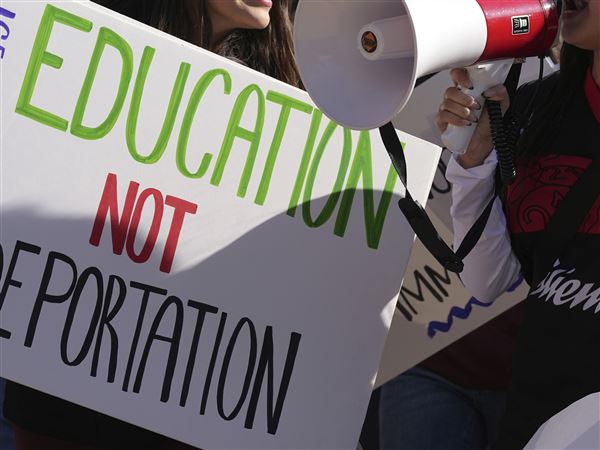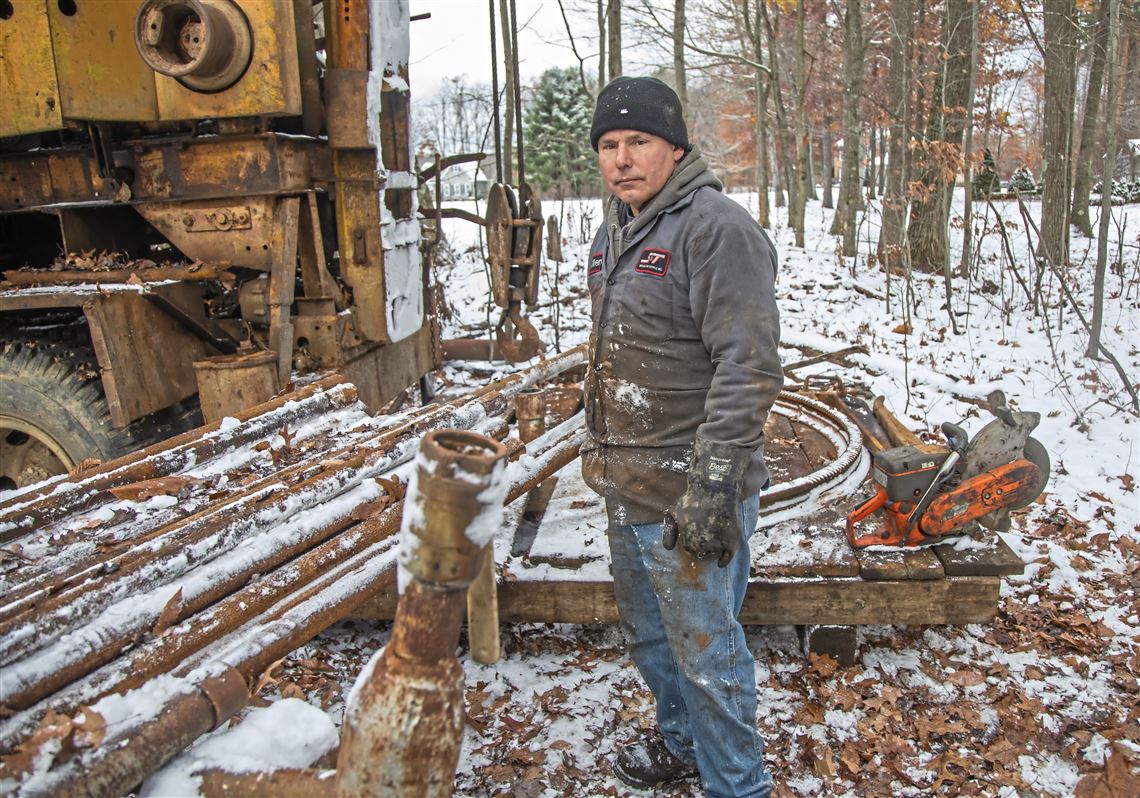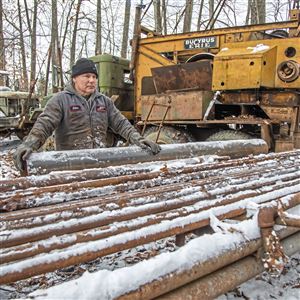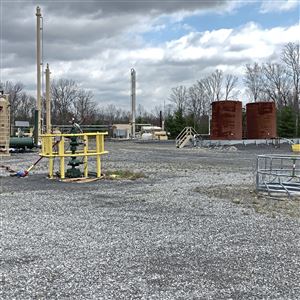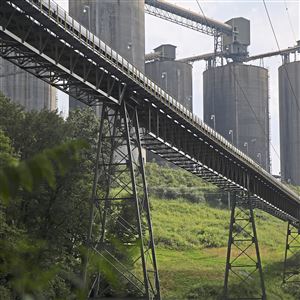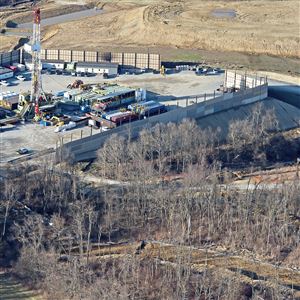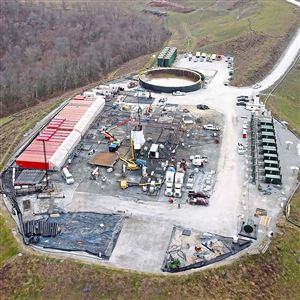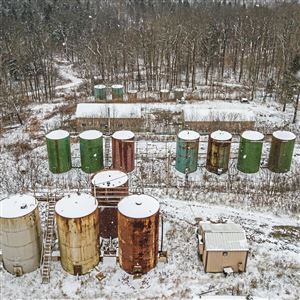State and national environmental groups are petitioning Pennsylvania’s environmental rule-making board to start requiring oil and gas companies to set aside enough money to plug their wells when they are tapped out.
The Sierra Club, joined by five other organizations, is prompting the Environmental Quality Board to make oil and gas companies pay bonds equal to the full cost of decommissioning their wells.
“Current bond amounts are so low companies are incentivized to go out of business instead of cleaning up,” said Kelsey Krepps, a senior campaign representative with the Sierra Club.
“This is a very commonsense fix to an issue that is proliferating within Pennsylvania — and it’s taxpayers who are dealing with it.”
Pennsylvania is already facing a potential $6.6 billion cleanup cost for an estimated 200,000 oil and gas wells that were drilled over a century and left behind, unsealed.
Raising bonds is meant to keep that from happening again as active wells age or as financially precarious operators go bankrupt.
Bonds act as a form of insurance by requiring oil and gas companies to demonstrate that they can afford to plug their wells before they start drilling and by protecting the state from cleanup costs if they fail.
For unconventional wells tapping into the Marcellus and other deep shale formations, the groups are seeking to raise bonds from $10,000 or less per well to $83,000 per well.
For conventional oil and gas wells, which are generally shallower and older, the groups are asking that bonds be raised to $38,000 per well. The current rate is $2,500 per well or a blanket bond of $25,000 to cover all of a company’s wells.
The higher bonds would apply to future wells and about 66,000 existing wells that were drilled beginning in 1985. About 12,000 of those are shale wells, and the rest are conventional wells.
Wells are considered abandoned under state law and should be plugged if they have not produced oil or gas for a year.
So far, abandonments have not been an issue with shale companies, whose wells are relatively new. But conventional well operators have abandoned thousands of wells to the state in just the past five years.
State law allows the environmental rule-making board to adjust bonding levels every two years to reflect current plugging costs, but rates have remained the same since they were established for conventional wells in 1985 and for shale wells in 2012.
Even modest efforts to change the low bonding amounts in Pennsylvania have been rolled back by the state Legislature.
The 1980s-era law that required oil and gas operators to start posting bonds when they drilled new wells initially required companies to secure bonds or make phased payments to cover all of their existing wells. But in the 1990s, the Legislature scrapped that part of the program and regulators had to give the money back to companies for wells drilled before 1985.
A 2012 law written to strengthen standards for shale gas wells raised bond amounts for all well types. But a budget amendment signed into law months later reversed course and exempted conventional wells from the higher bonds.
Fearing a wave of abandonments of conventional wells, regulators have vowed to evaluate raising the required bond payments, but they have not yet taken action.
Jamar Thrasher, a spokesman for the state Department of Environmental Protection, said the agency is not formally developing its own proposal for changing bonding levels at this time.
He said it “would be premature to comment on the merits of these petitions.”
Ankit Jain, an associate attorney with the Sierra Club, said the petitions are an effort to prompt regulators to act on an issue they recognize but haven’t addressed.
“We’re hoping this can push them to actually confront the issue,” he said.
After DEP reviews the petitions, the Environmental Quality Board will have to decide whether or not to initiate the process for raising bond payments to the levels the environmental groups suggest or to some other amount DEP determines is appropriate.
If the board decides not to raise bonding levels, the environmental groups can appeal to the courts.
The Sierra Club commissioned Jeremy Weber, an economist at the University of Pittsburgh, to calculate bonding amounts that would cover the full cost of well plugging and cleanup.
His report recommends lower bonds than the petition — $25,000 per conventional well and $70,000 per unconventional well — but those amounts are based on contract costs for plugging 55 wells at a time. In the past decade, DEP plugging contracts have covered an average of 14 wells at a time, and the costs per well have been higher.
Experiences in Texas and North Dakota, when those states increased bond amounts, suggest Pennsylvania might expect that higher bonding “will improve environmental outcomes, have little effect on aggregate industry activity and potentially shift wells among operators,” Mr. Weber wrote.
When Texas strengthened bonding requirements for conventional wells in the early 2000s, about 5% of operators exited the market, he wrote. But those companies “were small on average and had poor environmental records,” and most of their wells were picked up by more financially secure companies.
“As a result,” he wrote, “the number of unplugged and abandoned wells decreased by 70% and violation of water regulations fell by a quarter.”
He also noted that raising bonding levels could bankrupt some operators of wells that no one wants to buy, thereby adding them to the list of castoffs the commonwealth will have to pay to plug. In those cases, he wrote, the question is likely not whether the wells would be abandoned to the commonwealth, but when.
Mr. Jain said those marginal wells and operators represent “a small segment of the problem.”
“We think the broader benefit is that the vast majority of operators will pay this higher bond amount and then, whenever they are done producing in the future, they will be able to plug the wells.”
Operators who can’t secure full-cost bonds also can’t afford to plug their wells, which means “they were de facto counting on the taxpayers to plug it for them,” he said.
“We don’t think that’s a business model the Pennsylvania government should support.”
Laura Legere: llegere@post-gazette.com.
First Published: September 22, 2021, 10:00 a.m.
Updated: September 22, 2021, 12:52 p.m.

